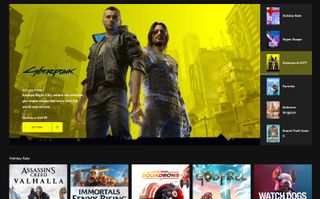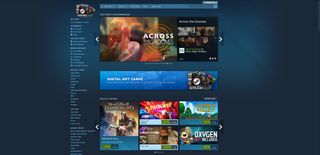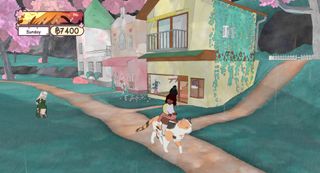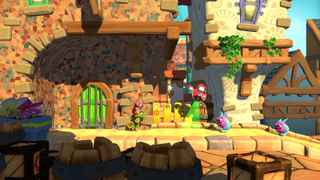After 2 years, the Epic Games Store is still a golden ticket for devs and irresistible bait for gamers
But has it grown into a true Steam rival?

The Epic Games Store celebrated its second anniversary recently. You can be forgiven for not setting a calendar reminder. The store's impact on the PC gaming landscape has been fascinating but controversial—a suspiciously philanthropic entity that's provided gamers with dozens of wonderful freebies, fledgling developers with financial security and a foot-up in a tough industry, and Steam with welcome competition.
It's also pissed a lot of people off. From fairly trifling issues about having to use a separate launcher other than the de facto PC darling Steam, to the slightly less trifling issues around aggressive platform exclusivity and its poor infrastructure when compared to Steam.
All of this can make for a confused tangle of feelings about the Epic Games Store, and even two years on, the merest mention of it seems to instantly inspire discussion and, more often than not, arguments. So as a sort-of birthday celebration (albeit one where I whisper all the recipient's character flaws into their ear while giving them a hug) I've decided to see how far it's come since its inception, and chat with the developers of games that have launched on both Epic and Steam to get an idea of how the creators themselves feel about the two platforms.

The state of the store
Clicking around the Epic Game Store's slick, flat pages today, the most striking problem is that it's largely as threadbare as it was two years ago. Its UI and frontend features just don't feel worthy of a platform that continues to snap up swathes of big IPs and indie games alike in exclusivity deals. And there are no community features—no hubs filled with silly memes and in-jokes, no place to chat with strangers (or with particularly gregarious developers), no workshops where players' passion for a game feeds back into it through mods.
On that last point, the Epic Games Store introduced mod support for its first game, MechWarrior 5, back in July. It's a start, but the lack of comments or forums strips away the sense of community that's so endemic to modding. It's like comparing Bethesda's controlled, sterile mod pages to the beautiful mess of Nexus Mods—I'll take the noise and the squalour and the occasional NSFW content over a controlled clean grid of thumbnail images any day. Modding is meant to be a bit messy.
The lack of these little rabbit warrens leads to a lack of discovery. When looking for new and unknown games to play on Steam, the trailers and screenshots only pull me in so far—it's more often the weird player stories, streams and community creativity that really shows me what a game is about. There's now a 'Discover' tab that serves as the store's front page, ostensibly to "help users find new interesting games", but the games it coughs up aren't exactly ones that anyone needs help discovering.

At the time of writing, five of the games on the first page of 'Discover' are big Ubisoft titles, sandwiched between Fortnite, Cyberpunk, Star Wars Squadrons and GTA 5. Only one of the ten games on display is an indie. The next thing you'll see when you scroll down is a selection of service games with holiday events—most of them already well known and popular—then you have the daily Christmas freebies. It's only after that do the indies really start filtering through, appearing in the 'New Releases' section a few scrolls down.
The biggest gaming news, reviews and hardware deals
Keep up to date with the most important stories and the best deals, as picked by the PC Gamer team.
In contrast, Steam greets me with no less than eight indie titles from the off, using my personal tastes to find games on sale I might be interested in. A little bit further down, I get a list of indies enjoyed by 'players like me' and daily community recommendations, which again highlights lesser-known games. Sure, the algorithms are inevitably imperfect, but they're at least getting my eyes on a wider selection of indie games, while on Epic the main way to get foregrounded as an indie is via the golden ticket of exclusivity or being the free game of the week.
Epic should be lauded for creating a publicly visible roadmap for Epic Games Store, but it also highlights the company's priorities. Recently added checkouts, currency localisation, wishlists and growing currency support are useful, but very much storefront-oriented. Achievements, enabled in July, are being added slowly, while a vaguely worded "social overhaul" and user reviews (that will be opt-in for developers) are still way off. There's no mention of remote play, streaming or family sharing—the kind of features that separate a storefront designed to sell games from a fleshed out platform designed to make gaming convenient and accessible.

How developers feel about the Epic Store
Of course, frustrations with the frontend need to be weighed against how developers feel about the platform, and for the most part it seems that those who have worked with both Epic and Steam are very happy with what's on offer.
Close to the Sun is an atmospheric indie game (think Bioshock without the combat) released in May 2019 as an Epic Store exclusive, before coming to Steam a year later. Developer Roberto Semprebene says that while sales likely weren't as high as they would have been with a Steam launch, the benefits of exclusivity far outweighed those lost prospective sales.
As a small company that wants to survive and grow, the Epic exclusive deal guaranteed that we would recover costs and continue developing.
Roberto Semprebene
Beyond Epic's covering of development and other projected costs, Close to the Sun's stint on the store as a free game of the week gave it an incredible boost, according to Semprebene. Suddenly, nearly a year after its initial release, dozens of media outlets, subreddits and deal sites were talking again about Close to the Sun, simply because it was the latest headliner on Epic's famous free games carousel.
"Would we have reached such an audience, being a small and independent studio, even if supported by the great guys of [publisher] Wired Productions?" asks Semprebene. "As a small company that wants to survive and grow, the Epic exclusive deal guaranteed that we would recover costs and continue developing. It also helped us to make our brand known to many gamers who probably did not know us."
Semprebene didn't want to share exact figures on purchases versus free downloads, but admitted that the free week played a big part in the game reaching around four million downloads in total. That's a lot of people owning a game that on Steam has only garnered 211 reviews.

In 2019, the developer of DARQ was approached about making it an Epic exclusive, and was told that exclusivity was the only way it would appear on the store. This doesn't seem to be a consistent rule, however, or Epic's eased up on it. All the developers I spoke to whose games simultaneously shipped on both stores said that Epic didn't express any reservations about it. One of these games is Calico, an irresistibly cute game about managing a cat cafe. The game's publisher Whitethorn Digital, a specialist in cute, small-budget indie games, compared the process of launching on Epic favourably to Steam.
"Great support, direct contact with a human being, simple staging, great backend tools, one-on-one support", says Whitethorn CEO Matthew White. "But on Steam, every time we launch a game, we spend five-six hours trying to get streaming to the page working, updating the store is a nightmare, build uploading has to be done by a member of our engineering team, and it's nearly impossible to get support to respond to your requests. Luckily, after four years in business and through the introduction of a mutual friend, we now have a reliable Valve contact, though this process was extremely difficult."
Gavin Price, studio director behind Playtonic's Yooka-Laylee and the Impossible Lair, was similarly pleased with his studio's dealings with Epic. "We've had no issues creating Epic builds and the store has offered great opportunities for our game to reach a very large audience (we launched as part of 2019's 12 games of Christmas)."

When I asked whether these studios would consider Epic exclusivity for future games, their response was a unanimous 'yes'. Price put it best: "Each game is its own bespoke puzzle in bringing to market in the best way possible, and in this day and age discoverability is always going to be a huge problem, so I think an exclusivity deal regardless of the platform can have huge benefits. We'd be very open-minded about such offers ourselves and can certainly empathise with developers who see this as the right thing to do by their game (that ultimately they could be relying on to make a living or springboard for future success)."
What's next?
So after two years, the Epic Games Store remains strangely similar to how it started in both design and principle—a virtual golden ticket for developers and an awkward but alluring platform for gamers, dazzling us with its gleaming hoard of free videogame riches. Its lack of community and discovery features are easy to ignore when Epic is keeping both sides of the equation satiated with its seismic show of monetary magnanimity.
But will the goodwill carry over into genuine consumer loyalty when Epic's free game sideshow comes to an end? Will indie games get the opportunities and exposure they need on the Epic Games Store without the publicity of exclusivity or being podiumed as the free game of the week?
Based on my own experience as a ritualistic beneficiary of Epic’s giveaways and £10 game coupons, I feel that loyalty towards the Epic Games Store is as shallow as the pages of the store itself. It’s not a convenient place to look for interesting new indie titles or arrange gaming get-togethers with friends; it’s a storefront with some eye-catching titles and claims to being a Steam competitor, but step inside and it’s an eerily hollow place, making me question the sincerity of the impressive window display as I inch back towards the exit.
There’s a lot of work to do here if Epic wants to hold my attention beyond this extended, expensive honeymoon period.
Robert is a freelance writer and chronic game tinkerer who spends many hours modding games then not playing them, and hiding behind doors with a shotgun in Hunt: Showdown. Wishes to spend his dying moments on Earth scrolling through his games library on a TV-friendly frontend that unifies all PC game launchers.
Most Popular


